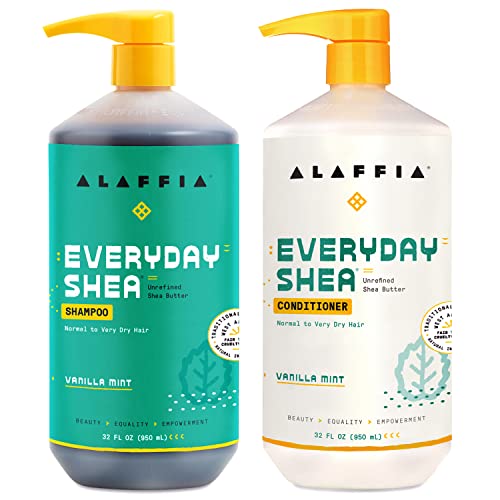
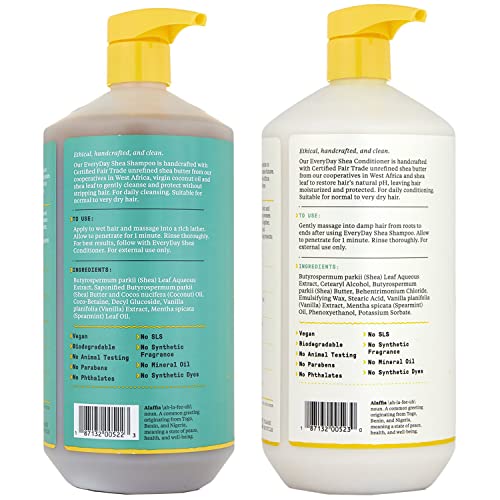
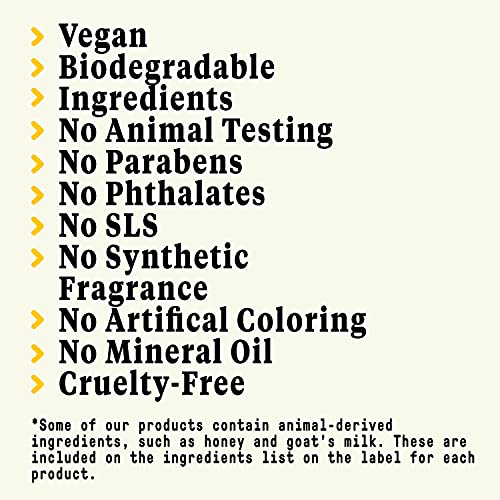
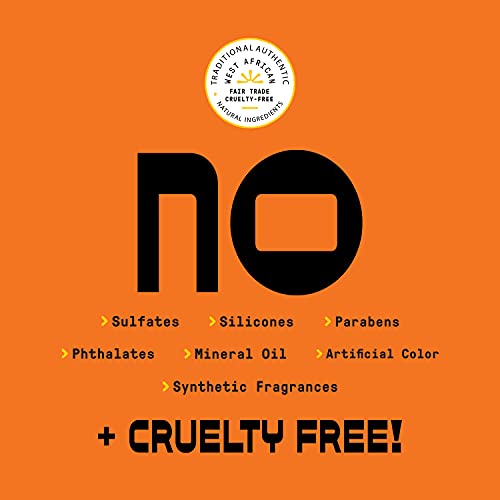

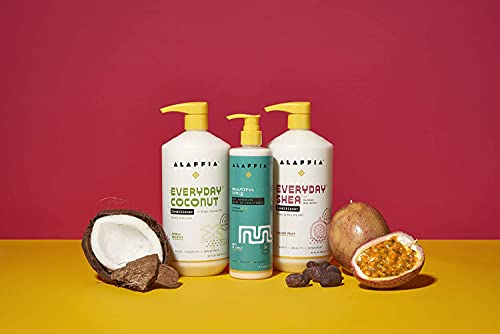
Alaffia EveryDay Shea Shampoo & Conditioner Set - Moisturizes, Gently Cleanses, Vanilla Mint - 32oz


Cocamidopropyl Betaine
High RiskCocamidopropyl betaine is a synthetic surfactant derived from coconut oil, commonly used in personal care products for its mild cleansing and foaming properties. It functions as a surfactant, emulsifier, and thickening agent, contributing to the texture and performance of formulations.
Sustai Insights
Cocamidopropyl betaine offers functional benefits as a gentle surfactant, enhancing product foaming and texture. However, it may pose low to moderate allergenic risks and is subject to high use restrictions due to contamination concerns. Regulatory bodies have advised on its safe levels of usage, categorizing its risk level as high overall. Users should practice caution, particularly with sensitive populations, and consider alternatives like naturally derived surfactants for safer formulations.
Behentrimonium Chloride
High RiskBehentrimonium chloride is a quaternary ammonium compound primarily used as a conditioning agent in hair and skin care products. It functions as an emulsifier and surfactant, helping to improve texture and manageability of hair.
Sustai Insights
Behentrimonium chloride offers functional benefits as a hair conditioner and emulsifier. However, it is associated with moderate allergenic potential and has high use restrictions due to regulatory concerns. It poses low risks for carcinogenicity and developmental toxicity but has been noted for neurotoxicity. Environmental risks include potential pollution and low biodegradability. Overall, the ingredient is assessed as high risk, and users should consider alternatives such as natural conditioners.
Picea Mariana Leaf Oil
High RiskPicea mariana leaf oil, derived from the needles of the black spruce tree, is commonly used in personal care products for its aromatic properties and potential skin benefits. It functions primarily as a fragrance component and may also have preservative qualities due to its natural antimicrobial properties.
Sustai Insights
Picea mariana leaf oil offers functional benefits as a natural fragrance and potential antimicrobial agent, which can enhance product stability. However, it carries high usage restrictions and is associated with low risk for carcinogenicity, allergies, and reproductive toxicity. Environmental concerns include potential pollution and bioaccumulation. Regulatory warnings indicate heightened caution in use. Overall, the ingredient presents a high risk assessment, and users are advised to consider safer alternatives or limit exposure.
Emulsifying Wax
Medium RiskEmulsifying wax is a mixture derived from plant and synthetic sources, primarily used to stabilize emulsions in cosmetic and personal care products. Its primary function is to blend oil and water-based ingredients, ensuring a uniform consistency and enhancing product texture.
Sustai Insights
Emulsifying wax offers functional benefits as an effective emulsifier, helping to create stable formulations in cosmetic products. It generally poses low health risks, with minimal concerns regarding carcinogenicity and allergenic potential. Environmental risks are also low, with no significant pollutant or bioaccumulation issues. However, use restrictions exist, and irritation potential is noted for sensitive skin. Regulatory assessments indicate it is safe for use within established concentration limits, leading to an overall moderate risk assessment. Alternatives like plant-based emulsifiers may offer sustainable options.
Potassium Sorbate
Medium RiskPotassium sorbate is a potassium salt of sorbic acid, primarily used as a preservative in food and cosmetic products. It inhibits the growth of molds, yeast, and some bacteria, extending the shelf life of products. It is commonly found in various formulations due to its effectiveness and low toxicity.
Sustai Insights
Potassium sorbate serves as an effective preservative, preventing microbial growth in food and cosmetic products, which is vital for safety and longevity. Although it has a low risk of carcinogenicity and developmental toxicity, there is a moderate concern regarding allergies and immunotoxicity. Environmentally, it poses minimal risks as it is not significantly bioaccumulative. Regulatory agencies have verified its use, although some products may face restrictions. Overall, it is assessed as a medium risk ingredient, with safe usage practices recommended, and alternatives such as natural preservatives could be considered.
Phenoxyethanol
Medium RiskPhenoxyethanol is a preservative used in cosmetics and personal care products to prevent microbial growth and extend shelf life. It is commonly found in formulations such as lotions, creams, and serums.
Sustai Insights
Phenoxyethanol serves effectively as a preservative, ensuring product stability and safety by inhibiting microbial growth. It is considered to have low health risks regarding carcinogenicity, allergies, and reproductive toxicity. However, moderate use restrictions exist, and regulatory bodies have advised caution in specific applications. Environmental concerns include its potential as a pollutant, although it is not highly bioaccumulative. Overall, the ingredient presents a medium risk level, with safe usage practices recommended and alternative preservatives available for those seeking greener options.
Stearic Acid
Low RiskStearic acid is a naturally occurring fatty acid commonly found in animal and vegetable fats. It functions primarily as an emulsifier, thickener, and stabilizer in cosmetic and personal care products, providing texture and consistency.
Sustai Insights
Stearic acid offers functional benefits such as effective emulsification and stabilization of formulations. It is derived from renewable sources and is biodegradable, contributing to its sustainability profile. Health risks are low, with minimal concerns regarding carcinogenicity, allergies, or reproductive toxicity. Environmental risks are also low, with no significant pollutants or bioaccumulation concerns noted. Regulatory bodies, including the FDA, do not impose restrictions on its use. Overall, stearic acid is assessed as low risk, and its safe usage practices are well-established, with no significant alternatives needed.
Decyl Glucoside
Low RiskDecyl glucoside is a glucose-based surfactant derived from natural sources, primarily used as a mild cleansing agent in personal care products. It effectively reduces surface tension, allowing for improved mixing of ingredients and enhanced cleansing properties without stripping natural oils from the skin.
Sustai Insights
Decyl glucoside offers functional benefits as a non-ionic surfactant, making it suitable for sensitive skin formulations. It is biodegradable and derived from renewable resources, supporting sustainability. Health risks are primarily low, with minimal concerns regarding irritation and allergies. Environmental risks are low, as it does not significantly contribute to pollution or bioaccumulation. Regulatory status is generally favorable, with low restrictions noted. Overall, decyl glucoside presents a low risk for use in consumer products, making it a suitable choice for gentle formulations.
Cocos Nucifera (Coconut) Oil
Low RiskCocos Nucifera (Coconut) Oil is derived from the kernels of the coconut palm. It is primarily used in cosmetic formulations for its emollient and moisturizing properties, making it suitable for skin and hair care products.
Sustai Insights
Coconut oil serves as an effective moisturizer and emollient, promoting skin hydration and softness. It is sustainably sourced and biodegradable. Health risks are minimal, with low concerns regarding carcinogenicity, allergens, and reproductive toxicity. Environmental impact is also low, as it does not contribute significantly to pollution or bioaccumulation. Regulatory bodies have not issued restrictions on its use. Overall, coconut oil presents a low risk for health and environmental concerns, making it a safe ingredient in cosmetic products.
Butyrospermum Parkii (Shea) Butter
Low RiskButyrospermum parkii (shea) butter is a vegetable fat derived from the nuts of the shea tree. It is commonly used in cosmetic formulations for its emollient properties, providing moisture and improving skin texture. Additionally, shea butter is known for its ability to enhance the stability of products and deliver a creamy texture.
Sustai Insights
Shea butter offers functional benefits as an effective moisturizer, enhancing skin barrier function and texture. It is sustainably sourced and biodegradable, contributing to eco-friendliness. Health-wise, it is associated with low risks for carcinogenicity, allergies, and reproductive toxicity. Environmental impacts are minimal, with no significant pollutant potential identified. Regulatory assessments indicate no current restrictions. Overall, the ingredient presents a low risk, making it a favorable choice in cosmetic formulations.
Vanilla Planifolia (Vanilla) Fruit Extract
Low RiskVanilla planifolia (vanilla) fruit extract is derived from the fruit of the vanilla plant. It is commonly used for its aromatic properties and as a flavoring agent in various products, including food, cosmetics, and personal care items.
Sustai Insights
Vanilla fruit extract offers functional benefits such as flavor enhancement and fragrance. It is sustainably sourced with low environmental impact and exhibits low risk for carcinogenicity and developmental toxicity. However, it may cause skin irritation in some individuals and has low to moderate allergenic potential. Regulatory bodies have not imposed significant restrictions, leading to an overall low risk assessment. Safe usage practices should be observed, and alternatives include synthetic vanillin for those seeking more stable options.
Cetearyl Alcohol
Low RiskCetearyl alcohol is a mixture of cetyl and stearyl alcohol, primarily used as an emulsifier and thickener in cosmetic formulations. It helps stabilize products, improve texture, and enhance moisturizing properties, making it common in creams and lotions.
Sustai Insights
Cetearyl alcohol offers functional benefits as an effective emulsifier and skin-conditioning agent, contributing to product stability and texture. It is generally recognized as safe, with low concerns for carcinogenicity, allergies, or reproductive toxicity. Environmental risks are minimal, as it is biodegradable and has low pollutant potential. Regulatory bodies have not imposed significant restrictions on its use. Overall, cetearyl alcohol is assessed to carry low risk, making it a suitable ingredient choice in cosmetic products.
Emulsifying Wax
Medium RiskEmulsifying wax is a mixture derived from plant and synthetic sources, primarily used to stabilize emulsions in cosmetic and personal care products. Its primary function is to blend oil and water-based ingredients, ensuring a uniform consistency and enhancing product texture.
Sustai Insights
Emulsifying wax offers functional benefits as an effective emulsifier, helping to create stable formulations in cosmetic products. It generally poses low health risks, with minimal concerns regarding carcinogenicity and allergenic potential. Environmental risks are also low, with no significant pollutant or bioaccumulation issues. However, use restrictions exist, and irritation potential is noted for sensitive skin. Regulatory assessments indicate it is safe for use within established concentration limits, leading to an overall moderate risk assessment. Alternatives like plant-based emulsifiers may offer sustainable options.
Potassium Sorbate
Medium RiskPotassium sorbate is a potassium salt of sorbic acid, primarily used as a preservative in food and cosmetic products. It inhibits the growth of molds, yeast, and some bacteria, extending the shelf life of products. It is commonly found in various formulations due to its effectiveness and low toxicity.
Sustai Insights
Potassium sorbate serves as an effective preservative, preventing microbial growth in food and cosmetic products, which is vital for safety and longevity. Although it has a low risk of carcinogenicity and developmental toxicity, there is a moderate concern regarding allergies and immunotoxicity. Environmentally, it poses minimal risks as it is not significantly bioaccumulative. Regulatory agencies have verified its use, although some products may face restrictions. Overall, it is assessed as a medium risk ingredient, with safe usage practices recommended, and alternatives such as natural preservatives could be considered.
Stearic Acid
Low RiskStearic acid is a naturally occurring fatty acid commonly found in animal and vegetable fats. It functions primarily as an emulsifier, thickener, and stabilizer in cosmetic and personal care products, providing texture and consistency.
Sustai Insights
Stearic acid offers functional benefits such as effective emulsification and stabilization of formulations. It is derived from renewable sources and is biodegradable, contributing to its sustainability profile. Health risks are low, with minimal concerns regarding carcinogenicity, allergies, or reproductive toxicity. Environmental risks are also low, with no significant pollutants or bioaccumulation concerns noted. Regulatory bodies, including the FDA, do not impose restrictions on its use. Overall, stearic acid is assessed as low risk, and its safe usage practices are well-established, with no significant alternatives needed.
Decyl Glucoside
Low RiskDecyl glucoside is a glucose-based surfactant derived from natural sources, primarily used as a mild cleansing agent in personal care products. It effectively reduces surface tension, allowing for improved mixing of ingredients and enhanced cleansing properties without stripping natural oils from the skin.
Sustai Insights
Decyl glucoside offers functional benefits as a non-ionic surfactant, making it suitable for sensitive skin formulations. It is biodegradable and derived from renewable resources, supporting sustainability. Health risks are primarily low, with minimal concerns regarding irritation and allergies. Environmental risks are low, as it does not significantly contribute to pollution or bioaccumulation. Regulatory status is generally favorable, with low restrictions noted. Overall, decyl glucoside presents a low risk for use in consumer products, making it a suitable choice for gentle formulations.
Cocamidopropyl Betaine
High RiskCocamidopropyl betaine is a synthetic surfactant derived from coconut oil, commonly used in personal care products for its mild cleansing and foaming properties. It functions as a surfactant, emulsifier, and thickening agent, contributing to the texture and performance of formulations.
Sustai Insights
Cocamidopropyl betaine offers functional benefits as a gentle surfactant, enhancing product foaming and texture. However, it may pose low to moderate allergenic risks and is subject to high use restrictions due to contamination concerns. Regulatory bodies have advised on its safe levels of usage, categorizing its risk level as high overall. Users should practice caution, particularly with sensitive populations, and consider alternatives like naturally derived surfactants for safer formulations.
Phenoxyethanol
Medium RiskPhenoxyethanol is a preservative used in cosmetics and personal care products to prevent microbial growth and extend shelf life. It is commonly found in formulations such as lotions, creams, and serums.
Sustai Insights
Phenoxyethanol serves effectively as a preservative, ensuring product stability and safety by inhibiting microbial growth. It is considered to have low health risks regarding carcinogenicity, allergies, and reproductive toxicity. However, moderate use restrictions exist, and regulatory bodies have advised caution in specific applications. Environmental concerns include its potential as a pollutant, although it is not highly bioaccumulative. Overall, the ingredient presents a medium risk level, with safe usage practices recommended and alternative preservatives available for those seeking greener options.
Cocos Nucifera (Coconut) Oil
Low RiskCocos Nucifera (Coconut) Oil is derived from the kernels of the coconut palm. It is primarily used in cosmetic formulations for its emollient and moisturizing properties, making it suitable for skin and hair care products.
Sustai Insights
Coconut oil serves as an effective moisturizer and emollient, promoting skin hydration and softness. It is sustainably sourced and biodegradable. Health risks are minimal, with low concerns regarding carcinogenicity, allergens, and reproductive toxicity. Environmental impact is also low, as it does not contribute significantly to pollution or bioaccumulation. Regulatory bodies have not issued restrictions on its use. Overall, coconut oil presents a low risk for health and environmental concerns, making it a safe ingredient in cosmetic products.
Behentrimonium Chloride
High RiskBehentrimonium chloride is a quaternary ammonium compound primarily used as a conditioning agent in hair and skin care products. It functions as an emulsifier and surfactant, helping to improve texture and manageability of hair.
Sustai Insights
Behentrimonium chloride offers functional benefits as a hair conditioner and emulsifier. However, it is associated with moderate allergenic potential and has high use restrictions due to regulatory concerns. It poses low risks for carcinogenicity and developmental toxicity but has been noted for neurotoxicity. Environmental risks include potential pollution and low biodegradability. Overall, the ingredient is assessed as high risk, and users should consider alternatives such as natural conditioners.
Butyrospermum Parkii (Shea) Butter
Low RiskButyrospermum parkii (shea) butter is a vegetable fat derived from the nuts of the shea tree. It is commonly used in cosmetic formulations for its emollient properties, providing moisture and improving skin texture. Additionally, shea butter is known for its ability to enhance the stability of products and deliver a creamy texture.
Sustai Insights
Shea butter offers functional benefits as an effective moisturizer, enhancing skin barrier function and texture. It is sustainably sourced and biodegradable, contributing to eco-friendliness. Health-wise, it is associated with low risks for carcinogenicity, allergies, and reproductive toxicity. Environmental impacts are minimal, with no significant pollutant potential identified. Regulatory assessments indicate no current restrictions. Overall, the ingredient presents a low risk, making it a favorable choice in cosmetic formulations.
Vanilla Planifolia (Vanilla) Fruit Extract
Low RiskVanilla planifolia (vanilla) fruit extract is derived from the fruit of the vanilla plant. It is commonly used for its aromatic properties and as a flavoring agent in various products, including food, cosmetics, and personal care items.
Sustai Insights
Vanilla fruit extract offers functional benefits such as flavor enhancement and fragrance. It is sustainably sourced with low environmental impact and exhibits low risk for carcinogenicity and developmental toxicity. However, it may cause skin irritation in some individuals and has low to moderate allergenic potential. Regulatory bodies have not imposed significant restrictions, leading to an overall low risk assessment. Safe usage practices should be observed, and alternatives include synthetic vanillin for those seeking more stable options.
Picea Mariana Leaf Oil
High RiskPicea mariana leaf oil, derived from the needles of the black spruce tree, is commonly used in personal care products for its aromatic properties and potential skin benefits. It functions primarily as a fragrance component and may also have preservative qualities due to its natural antimicrobial properties.
Sustai Insights
Picea mariana leaf oil offers functional benefits as a natural fragrance and potential antimicrobial agent, which can enhance product stability. However, it carries high usage restrictions and is associated with low risk for carcinogenicity, allergies, and reproductive toxicity. Environmental concerns include potential pollution and bioaccumulation. Regulatory warnings indicate heightened caution in use. Overall, the ingredient presents a high risk assessment, and users are advised to consider safer alternatives or limit exposure.
Cetearyl Alcohol
Low RiskCetearyl alcohol is a mixture of cetyl and stearyl alcohol, primarily used as an emulsifier and thickener in cosmetic formulations. It helps stabilize products, improve texture, and enhance moisturizing properties, making it common in creams and lotions.
Sustai Insights
Cetearyl alcohol offers functional benefits as an effective emulsifier and skin-conditioning agent, contributing to product stability and texture. It is generally recognized as safe, with low concerns for carcinogenicity, allergies, or reproductive toxicity. Environmental risks are minimal, as it is biodegradable and has low pollutant potential. Regulatory bodies have not imposed significant restrictions on its use. Overall, cetearyl alcohol is assessed to carry low risk, making it a suitable ingredient choice in cosmetic products.
Discover the Alaffia EveryDay Shea Shampoo and Conditioner Set, designed for normal to very dry hair. This vegan-friendly duo utilizes fair-trade shea butter and coconut oil to gently cleanse and deeply moisturize your hair, leaving it soft and vibrant.
- Gentle Cleansing: This shampoo effectively cleans your hair and scalp without stripping natural oils, formulated without sulfates.
- Intensive Hydration: The rich conditioner, infused with shea butter and vanilla mint, replenishes moisture, enhancing shine and manageability.
- Ethically Sourced: Made with fair-trade ingredients from women-led cooperatives in West Africa, supporting education and environmental sustainability.
- Safe and Clean: Free from parabens, phthalates, silicones, and artificial fragrances, ensuring a pure and safe hair care experience.
- Easy to Use: Simply wet hair, apply the shampoo and conditioner, and enjoy the refreshing scent while nurturing your hair and scalp.
Alaffia’s commitment to sustainability and social equity shines through in every bottle, making hair care an act of empowerment.
Subscribe & Save with Sustai
- Best Price Guarantee: Always enjoy the lowest prices on sustainable home essentials.
- No Surprises: We’ll notify you before shipping. No hidden fees, ever.
- You’re in Charge: Change, pause, or cancel your subscription anytime with ease.
- Eco-Friendly Deliveries: Our grouped shipments mean less packaging and lower emissions.
Join us on a sustainable journey. Special offers for a limited time! Prices and promotions may change.
Recommended Products
Discover the Alaffia EveryDay Shea Shampoo and Conditioner Set, designed for normal to very dry hair. This vegan-friendly duo utilizes fair-trade shea butter and coconut oil to gently cleanse and deeply moisturize your hair, leaving it soft and vibrant.
- Gentle Cleansing: This shampoo effectively cleans your hair and scalp without stripping natural oils, formulated without sulfates.
- Intensive Hydration: The rich conditioner, infused with shea butter and vanilla mint, replenishes moisture, enhancing shine and manageability.
- Ethically Sourced: Made with fair-trade ingredients from women-led cooperatives in West Africa, supporting education and environmental sustainability.
- Safe and Clean: Free from parabens, phthalates, silicones, and artificial fragrances, ensuring a pure and safe hair care experience.
- Easy to Use: Simply wet hair, apply the shampoo and conditioner, and enjoy the refreshing scent while nurturing your hair and scalp.
Alaffia’s commitment to sustainability and social equity shines through in every bottle, making hair care an act of empowerment.

You can have at most 2 Sustainable Steals products in your cart
Customer Reviews
Customers’ View
Customers generally appreciate the natural and gentle formulation of this shampoo and conditioner set, highlighting its sulfate-free and vegan qualities. Many users report that the product effectively moisturizes and softens their hair without leaving a harsh chemical feel, making it suitable for sensitive scalps and children's hair. Positive sentiments include comments on the product's ethical sourcing and commitment to cruelty-free practices, which resonate well with environmentally and health-conscious consumers. However, some users have noted inconsistencies in product texture and effectiveness, with a few experiencing issues such as a watery consistency or a less favorable feel to their hair. Overall, the product is recognized for its quality ingredients and social impact, aligning with sustainable and health-focused values.
AI-generated from the text of customer reviewsThis product has no reviews yet.





